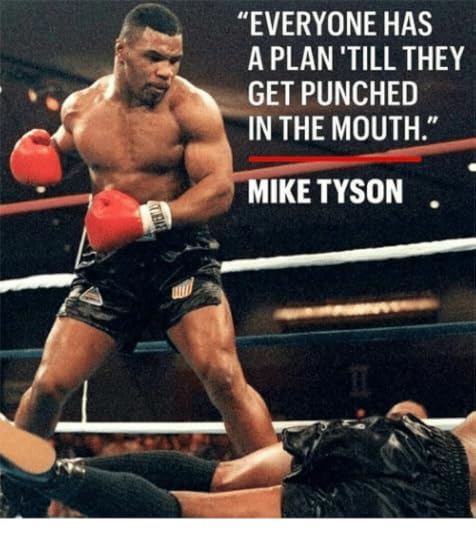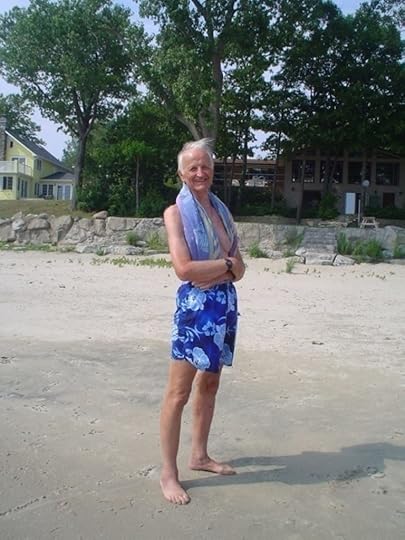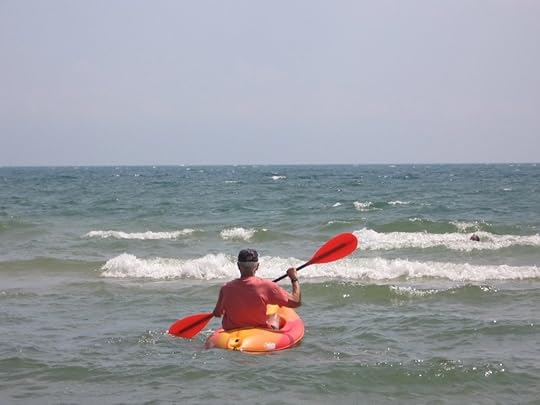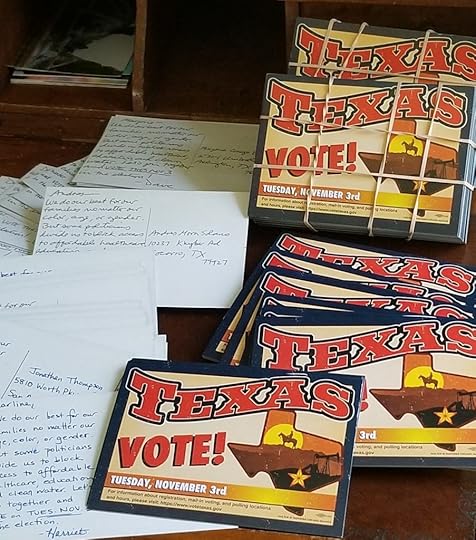David Klein's Blog, page 59
October 14, 2020
My Front Yard Today
Six-Word Memoirs
There is a legend about Ernest Hemingway responding to a challenge to write a six-word story with this: “For sale: baby shoes, never worn.”
That’s about as devastating and definitive as a story can be–whatever its length. And it has inspired many writers to construct six-word stories and memoirs.
Here’s another one, unlikely written as a six-word memoir, but perfectly fitting the form: “I came, I saw, I conquered.”
Here are some I’ve come up with that fall into the “memoir” category:
Fourth of five kids. Mostly ignored.
Shy as kid, introverted as adult.
Not quite according to expected outcome.
Found a partner, things got better.
One kid, then two. Meaningful life.
Years keep passing, hanging in there.
If I didn’t write, then nothing.
My tiny mark of meaning. Unseen.
Yet I am loved. Am alive.
Want more? Here are six-word COVID-19 stories.
The post Six-Word Memoirs appeared first on by David Klein.
October 12, 2020
Chained to the Power Grid
The power went out at 4 pm on October 7 when a fierce 10-minute wind and rain storm blitzed the area. Trees were down all over town. Not in my yard, but in the one next door. The power lines dangled on the ground.
 Electricity was scarce, but firewood aplenty.
Electricity was scarce, but firewood aplenty.Thus began 77 hours of living off the grid. We lit our candles and wore our headlamps because night came early. We emptied our chest freezer and moved its contents one hour east to Harriet’s mother’s freezer. We followed the infrastructure repair status using our mobile phones and data plans. I spent an afternoon cutting and collecting firewood around town.
Our refrigerator melted. Our house was cold in the morning. We longed for the electricity to be restored.
It’s a bit alarming how dependent we are on a power grid that seems so vulnerable. There’s really not much you can do about it. You want to live off the grid? You’ll need a solar installation, or your own personal wind turbine, or a micro-hydro generating system. None of that comes cheap.
Apparently living off the grid and still having electricity is for the wealthy. Or for the eccentric–if you’re willing to forgo the electricity.
I’m not wealthy and I’m not willing to forgo electricity. I work from home, so does Harriet now. We need juice, we need wi-fi. We live in the Northeast–we need heat.
 That’s going to take some fixing.
That’s going to take some fixing.We were one of the last houses in our town to have power restored. At one point we got to look across the street at the brightly-lit house of our neighbors. Just down the block, someone was flaunting their Halloween lights. Grr.
The utility crews worked long, hard hours. Eventually, our electric service resumed. I was back to being chained to the grid.
The post Chained to the Power Grid appeared first on by David Klein.
October 7, 2020
It Hurts Getting Punched in the Mouth

I’m not a boxing fan, I’m not even a Mike Tyson fan, but I’m a big fan of this quote attributed to the fearsome warrior: “Everyone has a plan until they get punched in the mouth.”
There are a number of military variations on this quote, such as “Plans are great until the shooting starts” or “No plan survives first contact with the enemy.” Dwight Eisenhower said that “In preparing for battle, I have always found that plans are useless but planning is indispensible.”
My interest and my takeaway: it’s important to plan in order to achieve your objectives, but you have to be prepared to adapt, and adapt quickly, as soon as something goes awry–and something always goes awry because you can’t predict the future.
When things don’t go according to plan, you have to rely on your skills, experience, confidence, determination . . . or anything else you can drum up.
I Had a Plan
My plan, conceived almost 40 years ago, was to be a novelist. Boy did I get punched in the mouth. I eventually got up from the mat, wiped off the blood, and did get a couple of novels published, hopefully with more to come.
But along the way, I had to make some alterations to the plan. Foremost, I had to make a living, which I discovered isn’t so easy for novel writers. I figured out a way to use my writing skills to get paid. And I battled through periods of self-doubt and frustration. I fought the demons. I endured countless rejections.
So things haven’t exactly unfolded the way I’d planned or hoped, but unfold they did in their own way. I learned to take a punch, and launch a counterattack.
The post It Hurts Getting Punched in the Mouth appeared first on by David Klein.
October 6, 2020
Playing in the Neighborhood

I looked out my window the other day and saw this going on in my front yard. I had kept one of the swings from the playset we had in our back yard when my own kids were young and I hung it out front from a maple tree. Every once in a while someone will come by and take a ride, usually a mom with her toddler.
I watched these two girls take turns pushing each other. Swinging as if they owned it. Then they poked around my Little Free Library and tromped across my lawn collecting chestnuts that had fallen to the ground. They found a stick and batted it against a rock. Then they crossed my driveway and into the next yard to explore some more.
What’s the big deal? None. Except you just don’t see that anymore: kids wandering the neighborhood unfettered, doing as they please, exploring, walking on lawns and through gardens. It gave me great pleasure to see this, that’s all. I did the same thing when I was a kid, and I thought it might have become a lost art.
The post Playing in the Neighborhood appeared first on by David Klein.
October 5, 2020
A Swim with My Dad
He died on this day October 5, 2014. Not in the way he or anyone would want to: suffering from Alzheimer’s disease, alone, in the middle of the night, in a nursing home.
Spare me such a fate.
I wrote the piece below a while back when I was thinking of him and wished he could have died another way. And I posted this brighter piece on his birthday last year.
Here’s to you, Bob Klein . . .
We’re in Canada at Thunder Bay Beach on Lake Erie, my father and me, standing at the shoreline. It’s a perfect late afternoon near the end of summer, the warm water lapping at our toes and the soft sand and hard pebbles contouring the bottoms of our feet. The sun glints like a thousand mirrors on the water’s surface. The long arc of the shoreline extends in either direction.
There’s the lighthouse in the distance, at Point Abino, a familiar blue pillar since my childhood.
It’s not even a pretty beach, just a small fenced public access squeezed between privately-owned waterfront homes extending in either direction. But it’s a pretty day and it’s my beach, the one where I spent every summer growing up. My father, now in his eighties, still has his summer home, just a block away. He still swims in this lake, almost every day.
Today will be his last swim.
There are other people on the beach — young families and a group of teens. My brother and his wife are sitting on beach chairs with their books. And I’m here, visiting for the weekend — I come at least once a month now.

Bob Klein has always been a good man, a humble man, soft-spoken and unassuming. Handsome. He’s a man of faith and of dignity. He believes in putting his fate in God’s hands, although I wonder if that belief is eroding.
Bob is a strong swimmer. In college, he captained his swim team at St. Bonaventure University. He can stroke and stroke — or could before he began to lose some of his coordination. That’s why somebody accompanies him when he swims now.
We walk into the shallows, where the water is the warmest, commenting on the beautiful day. We get along well, my father and I, although we haven’t always been close. He wasn’t the kind of father who had deep and meaningful conversations with his children (there are five of us). Maybe it was just the era when I grew up, in the 1960s and 1970s, or maybe it’s simply the nature of his character — and mine, too.
Once we get about waist deep, we exchange a glance and both take the plunge, diving below the surface, pushing through the water, cooler near the bottom, holding our breaths, then springing up.
“Oh, that’s nice,” he says, surfacing, the water dripping from his face.
I think I disappointed him a lot when I was younger. I got in some trouble. I lacked direction. I moved away to college when I was seventeen and hardly looked back. But I love my father, and I know he loves me.
We swim out to shoulder depth (we’re both tall, over six feet). We can see across to the other side, the United States. It’s probably ten or fifteen miles as the crow flies, or as the man swims. We used to talk about swimming across (ha, ha). We used to talk about walking along the beach, beach after beach, over sand and rock outcroppings — Thunder Bay, Windmill Point, Crescent Beach, Bertie Bay — all the way to the Peace Bridge at the mouth of the Niagara River. We never took that journey.

Today is his last swim because tomorrow his wife, Audrey (my mom died 30-something years ago and Bob remarried at one point), is taking my father back to Buffalo and putting him in an assisted living facility for residents with dementia. She can’t take care of him any longer. His behavior is too erratic and difficult. He’s done some things I don’t want to mention because they are humiliating and degrading, and if he knew he’d done them he’d be horrified and ashamed.
I know he doesn’t want to live this way. No one does.
I look back toward the shore and see moms watching their kids play in the shallows or in the sand. Sunbathers on the beach. Two guys tossing a football. My brother reading his book under a beach umbrella to protect him from the sun.
“Do you want to swim out a little farther?” I ask.
I don’t think he hears me.
“Remember when we used to talk about swimming across?”
He laughs at this.
“Do you want to try? To swim all the way across?” It’s a question I came up here planning to ask him and my heart beats a little faster when I do.
It may be immoral, but I’ve had this thought: My father can avoid the slow, inexorable black decline into mental nothingness and catatonia. He can swim straight out, deeper and deeper, farther and farther from the shore, intending to cross the lake, swim until he’s too exhausted to continue, and I will swim by his side and be there when he finally sinks and we’re too far out for me to save him. I would have to swim back alone.
“Swim across the lake?” he says.
“What do you think?”
He stares at the horizon, the hills rising above the far opposite shore, and then he looks at me and I see something in his eyes, what I interpret as a melancholy, despairing recognition of his situation, and his inability to do anything about it.
“It’s too far,” he says quietly.
He knows. I’m sure he knows.
“You’re right,” I say. “We’d never make it.” Although, knowing my father’s grit and determination, he just might make it across. I’m the one who would tire, flounder, and drown.
We head back to shore and wrap ourselves in towels and dry off in the sun. The next day he ends up in a place in Buffalo called Park Creek. A year later he’s moved to a nursing home. I keep visiting every month, witnessing the fade. I’m not sure if he knows who I am. A year later he is dead, and I am the one drowning.
The post A Swim with My Dad appeared first on by David Klein.
October 2, 2020
Is No News Good News?
It’s been two weeks since Ruth Bader Ginsberg died. That day, September 18, was a turning point for me. I was so fond of RBG. She represented my moral compass. She represented everything I wanted our country to embrace.
I was crushed. Grieving. Near a state of panic.
I had to turn off the news after I heard of her death. I blocked notifications from the New York Times. I stayed away from all the bookmarked news sites I used to visit multiple times a day: AP News, the New York Times, CNN, Reuters, even Fox to see what propaganda the right wing was spewing. If I did go on Facebook to share one of my blog posts, I quickly scrolled past all the political ranting and advertising, both from the left and right.
I kept away from the news because I knew what was coming next with the Supreme Court. I knew how awful it would be for our nation. I’d already been making myself anxious and depressed over the news, and I had to take steps to prevent a complete downward spiral of my mental health. That’s how bad things had gotten for me.
Instead, I wrote postcards to swing-state voters. I re-read a favorite novel from long ago: A FAREWELL TO ARMS, Hemingway’s classic love story/war novel. I read EVENTIDE, by Kent Haruf, an author I’d heard about but had never gravitated toward. It was a fine novel.
I began reading a book about the protests in Birmingham, AL in the 1960s. I watched a 3-plus hour movie, MAGNOLIA, a film structured around various characters whose story arcs intersect each other (STASH, CLEAN BREAK).
Many times during these past two weeks I reached for my phone only to put it down again because I remembered I wasn’t reading the news. I wouldn’t say I began to feel better, but I felt less consumed, less overwhelmed by the state of our country and the world.
Still, the New York Times arrives every morning and I go outside and get the newspaper off the driveway and bring it in for Harriet, and she has been kind enough not to tell me all the terrible things going on.
But then came the first presidential debate. For some misguided reason, I believed it was my duty as a citizen to watch it. I lasted less than five minutes before turning off that dumpster fire.
And then early this morning I got a text from Julia telling me that our dear leader had COVID-19, along with his wife and several others. I don’t typically wish misfortune on anyone, but I have to say I was pleased to hear this. Maybe in some cosmic way, this is the event that can balance the loss of RBG.
Still, I’m not reading about it. I’m not staying up on the news. Only one piece of news matters anyway: what happens November 3.
The post Is No News Good News? appeared first on by David Klein.
September 25, 2020
Can a Hand-Written Note Make a Difference?
Living in the cerulean state of New York, I’m looking for ways to contribute to the upcoming election. Other than voting. I signed up with an organization to hand-write 400 postcards to registered Democratic voters in swing states, encouraging them to vote on Nov. 3.

I was assigned Texas—The Lone Star State—and sent a supply of postcards. I was also provided with what reads like a data-driven and well-workshopped script. I know it by heart:
We do our best for our families no matter our color, age, or gender. But some politicians divide us to block access to affordable healthcare, good schools, and clean water. Let’s join together and vote Tues. Nov. 3 in the election!
My task: Write the note, add name and address, check the name off the master list, stamp the postcard (I buy the stamps) and mail.
Straightforward. And yet—an adventure.
I forgot how bad my handwriting is. It really sucks—almost indecipherable to anyone but me, and even I’ve been stumped when reading back through one of my journals.
But these postcards are blank and have to be handwritten. The handwritten card is more effective, according to research.
 This is one of my best ones. Can you read it?
This is one of my best ones. Can you read it?I used to have decent handwriting. As I kid I imitated my father’s writing (and forged his signature a few times), and over the years added my own flourishes to create a style my own. But then I learned to type—and type fast. My thoughts synched up with the speed of my typing, and so whenever I wrote by hand, my pen would be racing to keep up with my mind, and my handwriting has since fallen apart.
I try to be careful writing the postcards. Each one takes about a minute and a half to write, plus another 30-40 seconds for the name and address.
I try some ALL CAPS PRINTING OF THE MESSAGE, but this takes too long, isn’t much easier to read, and even I get annoyed by the sense I’m shouting.
I discover other ways to minimize my handwriting damage: Place the exact same words on each line, every time. Slowing down for tricky words—“clean” turns out to be a challenge; “no matter our” looks like a scribble of mountain peaks.
A few times I lose control of my pen and letters collide in the middle of the word, leaving an inky wreckage. All I can do is move on. Next sentence. Next postcard.
At one point I veer from the script and change “good schools” to “education” and don’t realize it until twenty postcards later. Move on. Next postcard.
My fingers lock, my mind deadens from the repetition of writing the same message over the same message over the same over and over again. I can handle up to ten postcards in a single sitting. I’m chipping away. Harriet has joined in. She has nicer handwriting. We have hundreds to go.
 The word is ‘clean’
The word is ‘clean’ I wish I could do better
I wish I could do betterI sign them, Dave. I never go by Dave, but it seems appropriate for these postcards. Dave is asking you to join together and vote in our best interest.
I’m a tiny bit hopeful. There are likely hundreds or thousands of other people doing the same thing as we are: writing postcards to swing-state voters. Who knows what might swing the election our way. Shouldn’t every vote count?
The post Can a Hand-Written Note Make a Difference? appeared first on by David Klein.
September 23, 2020
A FAREWELL TO ARMS: Ernest Hemingway
I first read A FAREWELL TO ARMS many years ago when I was going through what the narrator, Frederic Henry, is going through in the novel: not the part about the war on the Italian front, but the experience of great love. This personal experience of love surely colored my impressions of the novel, yet its standing as one of the Most Important Novels in My Life remains assured.

If you can appreciate novels of war and love, this book is for you. The narrator struggles throughout the story with the horrors and boredom of working as an American ambulance driver for the Italian army in World War I. He is wounded by shelling, later almost shot during a retreat, and barely escapes in a riveting narrative sequence. But the novel is also about how he meets and falls in love with a British nurse, Catherine Barkley, and their intense relationship is juxtaposed over the war story.
The ending of the novel is devastating and unexpected. A few years ago, a special edition of the novel was published that included 37 different endings that Hemingway considered for the novel. He’d been quoted as saying the reason he wrote so many revisions was that he had to get the words right.
But to consider so many endings to a novel tells me that the writer really didn’t know where the novel was heading, and certainly not where it would end up, so the ending he did finally “get right” has an almost arbitrary feeling about it. Yes, powerful. Yes, devastating realism that upended the literary style of the day. But it never felt like the inevitable conclusion of the story.
There is no question of Hemingway’s place in our country’s literary history: his voice and style changed a generation of writers, inspired many imitators, and earned him a Nobel Prize. But A FAREWELL TO ARMS includes a lot of pointless drinking scenes and dull ribbing between the officers, and some of the dialog sounds so unnatural it must belong to a different era. Which it does. So some of the flaws we see today might have been strengths when the novel was published in 1929.
5/5 Stars
The post A FAREWELL TO ARMS: Ernest Hemingway appeared first on by David Klein.
September 21, 2020
Ruth, You Were A Rock Star
I’m crushed over Ruth Bader Ginsberg’s death. Not just mourning for her and the incredible work she’d done for all Americans and women especially as an attorney and a Supreme Court justice. But I’m also consumed with anxiety because of the Supreme Court vacancy her death creates just a few weeks before the election, with two-faced, lying, duplicitous republican senators saying they will fill the seat before the election.
How depressing when those in power, those entrusted as the leaders of our nation and democracy, are nothing but corrupt, power-grubbing weasels.

Oh, RBG, you hung in there for so long. You served us so well. You did your best to survive so that another president might fill your seat someday. I know it was widely considered a mistake for you to make a political statement, but I’m so glad you said Trump was a faker when he was running for president. It had to be done. And how right you were.
I don’t know if there’s another person—man or woman—who I would point my kids to and say: “Be like her as much as you can and you will live a meaningful life.”
We so admired RBG in our home that Harriet once dressed as her for Halloween and did a damn good job on the costume. Notorious RBG, may you RIP.
The post Ruth, You Were A Rock Star appeared first on by David Klein.






